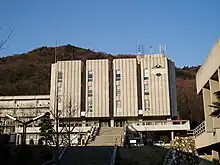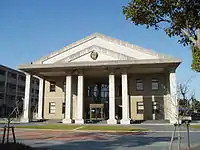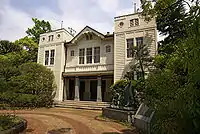兵庫県立大学 | |
| Type | Public |
|---|---|
| Established | 2004 |
| President | Masayoshi Kiyohara[1] |
Administrative staff | 555 full-time[2] |
| Students | 6,158[2] |
| Undergraduates | 5,286 |
| Postgraduates | 872 |
| 172 | |
| Location | , , |
| Campus | Suburb |
| Website | www.u-hyogo.ac.jp |

The University of Hyogo (兵庫県立大学, Hyōgo kenritsu daigaku, lit. 'Hyogo Prefectural University') is a public university in Kobe, Hyogo, Japan.
History
The University of Hyogo (UH) was established in April 2004 by integrating three universities which were run by Hyogo Prefecture government: Kobe University of Commerce (神戸商科大学, Kōbe shōka daigaku), Himeji Institute of Technology (姫路工業大学, Himeji kōgyō daigaku) and the College of Nursing Art and Science, Hyogo (兵庫県立看護大学, Hyōgo kenritsu kango daigaku).[3]
At its foundation, UH opened a new independent campus (with its headquarters) in the Harborland (Chuo-ku, Kobe); the other campuses were those of the predecessors:
- former Kobe University of Commerce:
- Kobe Gakuentoshi Campus (in Nishi-ku, Kobe)
- former Himeji Institute of Technology:
- Himeji Shosha Campus (in Himeji, Hyogo)
- Harima Science Garden City Campus (in Kamigori-cho, Hyogo)
- Himeji Shinzaike Campus (in Himeji, Hyogo)
- former College of Nursing Art and Science, Hyogo:
- Akashi Campus (in Akashi, Hyogo)
Below are the histories of the predecessors:
Kobe University of Commerce

KUC was founded in 1929 as Hyogo Prefectural Kobe Higher Commercial School (兵庫県立神戸高等商業学校), a men's college (for age 17-20 or above).[4] Because in 1929 the older Kobe Higher Commercial School (a national college) was reorganized into older Kobe University of Commerce (for age 19-22 or above; see Kobe University), the prefecture lost a college for boys at age 17–20. So the prefecture founded its own commercial college. The campus was located on a hill called Seiryōdai (星陵台, lit. Starry Hill) in Tarumi. In 1944 the college was renamed Kobe College of Economics (神戸経済専門学校). Among the notable alumni are Isao Nakauchi (the founder of Daiei) and Nobuo Okishio (who finally graduated Kobe University).[5]
In 1948 the college was reorganized into Kobe University of Commerce, the first public university under Japan's new educational system. In 1990 KUC moved to present-day Kobe Gakuentoshi Campus.[6]
Himeji Institute of Technology

HIT was founded in 1944 as Hyogo Prefectural Technical School (兵庫県立高等工業学校), a men's college with three departments: Mechanics, Electronics and Applied Chemistry. The first campus was located on a hill of Goinoike, Nagata-ku, Kobe. In 1945 the campus was heavily bombed; in 1946, after World War II, the college was removed to Idei, Himeji.[7]
In 1949 the school was reorganized into Himeji Institute of Technology under Japan's new educational system. In 1957 HIT department of junior college was reorganized into Himeji College, an independent college; in 1965 the college was removed to present-day Himeji Shinzaike Campus (the former campus of Himeji Higher School, a predecessor of Kobe University). HIT moved to present-day Himeji Shosha Campus in 1970. In 1990 HIT School of Science was established, and new Harima Science Garden City Campus was opened for the school in 1991. In 1998 Himeji College was reorganized into HIT School of Human Science and Environment.
College of Nursing Art and Science, Hyogo
CNASH was established in 1993; it was the first public 4-year college of nursing in Japan. The Graduate School was implemented by 1999 (both Master's and Doctoral programs).
Undergraduate Schools
- in Kobe Gakuentoshi Campus:
- School of Economics
- School of Business Administration
- in Himeji Shosha Campus:
- School of Engineering
- in Harima Science Garden City Campus:
- School of Science
- in Himeji Shinzaike Campus:
- School of Human Science and Environment
- in Akashi Campus:
- College of Nursing Art and Science
Graduate Schools

- in Kobe Campus:
- Graduate School of Simulation Studies
- Graduate School of Applied Informatics
- in Kobe Gakuentoshi Campus:
- Graduate School of Economics
- Graduate School of Business Administration
- Graduate School of Accountancy (Department of Professional Accountancy)
- in Himeji Shosha Campus:
- Graduate School of Engineering
- in Harima Science Garden City Campus:
- Graduate School of Material Science
- Graduate School of Life Science
- in Himeji Shinzaike Campus:
- Graduate School of Human Science and Environment
- in Akashi Campus:
- Graduate School of Nursing Art and Science
Institutes
- Research Institute for Economics and Business Administration (in Kobe Gakuentoshi)
- Laboratory of Advanced Science and Technology for Industry (in Harima Science Garden City)
- Institute of Natural and Environmental Sciences
- Research Institute of Nursing Care for People and Community (in Akashi)
Academic rankings
| Ranking | |
|---|---|
| all universities in Japan | 11th[8] out of all the 744[9] universities which existed as of 2006 |
| Source | 2006 survey[8] by Weekly Diamond on the ranking of the universities which produced the high ratio of the graduates who hold the position of "president and chief executive officer of listed company" to all the graduates of each university |
References
- ↑ http://www.u-hyogo.ac.jp/pdf/english.pdf
- 1 2 "University of Hyogo: 学生数・教職員数について" [University of Hyogo: Number of Students & Staff] (in Japanese). April 2007. Archived from the original on 2012-12-19. Retrieved 2008-10-06.
- ↑ "UNIVERSITY OF HYOGO". www.u-hyogo.ac.jp. Retrieved 2023-09-06.
- ↑ The official website of UH: About University of Hyogo uses the name of Hyogo Commercial High School in Kobe. It was not a present-day high school (for age 15-18; an institution for secondary education) but a college (for age 17-20).
- ↑ "University of Hyogo". Times Higher Education (THE). 2021-10-21. Retrieved 2023-09-06.
- ↑ "University of Hyogo | JPSS for international students". JPSS, the information site of studying in Japan. Retrieved 2023-09-06.
- ↑ "University of Hyogo". Times Higher Education (THE). 2021-10-21. Retrieved 2023-09-06.
- 1 2 Weekly Diamond The ranking of the universities which produced the high ratio of the graduates who hold the position of "president and chief executive officer of listed company" to all the graduates of each university(in Japanese)
- ↑ The number of universities and students|National Universities Association(in Japanese)